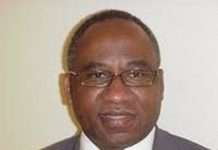(By Adebayo Oladejo)
In this exclusive interview with Pharmanews, Pharm. George Agbude, managing director, Teglo Pharmacy Nigeria Limited, Iju Agege, and zonal coordinator, Association of Community Pharmacists of Nigeria (ACPN), Iju/Agege Zone, shared some of his experiences from the early days as a fledgling pharmacist to the present day as an established community pharmacist.
He also spoke about some of the major challenges facing the practice, especially in his zone and the state in general.
Read the interview below:
How long have you been in the community practice and how was it when you started?
I have been in this practice since 1991; but at that time, I was still working with people, but in 1996, my own pharmacy, Teglo Pharmacy was born. However, it was not easy when I started because finance is always a major challenge to most community pharmacists. Still, I was a bit lucky when I started because I had worked with some senior colleagues and that had made me to know so much about community practice; and by the time I was ready to take off with Teglo Pharmacy, I had gained enough experience and made so many friends in the industry. In fact, my advice to our young ones who are aspiring to go into community practice is that they should strive to serve under the tutelage of an established community pharmacist for a period of, at least, five years before they establish their own pharmacy. By the time I started, how to raise capital, knowing where to buy quality drugs and so many other useful considerations were no longer problems for me and that was because I had gained enough experience from 1991 to 1996.
How lucrative is community pharmacy practice business in this part of the state?
Community pharmacy practice, as a matter of fact, is very lucrative but very challenging. It’s very challenging in the sense that you have to give up a lot of things for the practice to succeed. For instance, you open your pharmacy in the morning and close in the evening.You stay there almost throughout the day and, all your life, you nurture and grow it, and that is a very big challenge.But, then, it is very lucrative, provided you do it according to how you are supposed to do it and with God on your side, you can be a very successful person in it. In fact we have a lot of successful people in the practice and they are all doing well.
How would you assess community pharmacy practice in this part of the country?
Community pharmacy practice in this part of the country is highly challenging.Challenging in the sense that we have to contend with lots of charlatans and patent medicine dealers. It is normal in this part of the country that, once somebody retires from work, the next thing they think of is to start community pharmacy and this has been a major challenge. These people are not professionals and they are not formally trained in the aspect drug-selling.They see it as merebuying and selling, which community pharmacy is not, as it involves professionalism. The patients need to be counselled.We need to see the patient, evaluate pharmaceutical care in terms of the drug the person is using and how best we can help the person. So, those quacks infiltrating the profession are causing a lot of havoc to the profession and they are not giving us access to really assist the masses in terms of their health care challenge.
Finance is another area that is hampering the growth of community pharmacy in the country. Community pharmacists are meant to cater for the needs of the people of our community; but in a situation where we are financially handicapped…and the banks are not really helping our situation because the condition they give most times could be more than what most practitioners can cope with. So, it has been a great challenge on our part.
Meanwhile, the practice is very interesting as it affords us opportunity to meet with lots of people, both rich and the poor and it makes us popular among the people of our community. I have had opportunities to meet with several people – couples, families – and I have interacted with them, counselled them, advised them and they have become like family to me.
Talking from the perspective of our zone, finance has been a great challenge to us. Also, when you go to our markets at night in this area, you see so many women with different kinds of baskets full of all assorted capsules for treating any ailment. This is a big challenge because people take all these drugs and before they know it they break down with different kinds of health challenges and when they come to us for remedy, we may not even know where to start from because they have taken lots of drugs and you are confused as a professional. So, to me, it’s a big challenge because I feel that this area needs to be looked into.
Recently,too, I have discovered that many young people are going down with kidney problems and I believe that all the drug abuse and misuse are some of the factors responsible for it.
Do you think ACPN, Lagos, is actually living up to expectations as an umbrella body for community pharmacists in the state?
They are really trying, especially when compared with other state branches across the federation.They are a pacesetter branch and I give them kudos for what they are doing. Recently they helped community pharmacists in the state to access Fidelity Bank loan so as to overcome the problem of finance. They have discovered that most of our colleagues want to practise but are limited by finance; so they helped them to access this soft loan and I give them kudos for that.
Do you have the statistics of all the registered community pharmacy outlets in this zone?
We are about to carry out the zonal mapping.Although we did it sometime ago, we want to update it this time around.But let me be sincere with you: there are more unregistered shops than the registered ones. I wouldn’t want to give a statistics until we are done with the new mapping of genuine pharmacies. Meanwhile, during the daytime, there are more registered pharmacies than the unregistered ones; but at night, there are more unregistered shops than the registered ones – these are the people who sell provisions during the day but suddenly turn to pharmacists at night.At night, they display more drugs in their shops than even most pharmacists.
What are the most common health conditions patients in this area come to the pharmacy for and why is this so?
Malaria has been a big challenge to everybody – not only the people of this area because, from the statistics available to us, malaria is a big challenge everywhere. However, environmental factors and other factors could be responsible for the rise in malaria cases in this area.The area is densely populated and the gutters are not flowing; there are stagnant gutters everywhere.Also the drainage system is bad and, generally, thelow level of environmental hygiene is not helping matters at all.
Malaria can be prevented if the drainage system is working well, if the bushes around are cleared and if there is availability of treated mosquito nets for people to use. So, to be sincere, we sell more of malaria drugs than any drug here.In fact, it is second to paracetamol.
If you were not a community pharmacist, which other areaofPharmacy would you have gone into and why?
If I was not in community practice, I would have loved to be in the industry because I believe in challenges; and that is the area I would have loved to work so as to explore and task my brain on so many things.
Who is your role model in pharmacy practice?
I don’t have a specific one but I have role models in this practice,including Prince Julius Adelusi-Adeluyi of Juli Pharmacy, Pharm. Ike Onyechi of Alpha Pharmacy, and Boluke Pharmacy. In fact, I mentioned Boluke pharmacy because of the way she came up – she started from the rough bottom and, today, she is making it big and we all look up to her.
How do you see the war on fake drugs and what other strategies can be adopted to effectively tackle this menace?
Fake drugs in Nigeria is a big issue and if the war must be won, the federal government must develop the nerve to really stand and fight it. I see fake drug as a cartel business in Nigeria and, from top to bottom, many people are involved because the mega drug business is not a business any person can go into.So,the federal and state governments and all other parastatals should have the nerve to stand and fight it; and if we must succeed in the war, it has to start from the federal government and there has to be punishment for those who trade in fake drugs. If we start doing that, even though we may not be able to wipe it out, we can curb it to an extent because so many people have suffered from it.
If the government can be bold enough to take some steps like impounding the drugs and sending culprits to about 20 years imprisonment, I am sure others would be scared to go into it because of the punishment.
Also on the part of the National Agency for Food and Drug Administration and Control (NAFDAC), the proliferation of fake drugs had started reducing at one time but, recently, it seems the problemhas resurfaced. Also this their new Mobile Authentication Service (MAS) doesn’t seem to be working as there are times you send it and the result you get is that the product is not genuine and you get confused because the drug came directly from the company and this has happened with Lonart and Ampiclox. In fact, ACPN has complained about it so many times.So I think the only way out is that drug fakers should be severely punished and the government should not spare anyone.
Pharm. George Agbude











generic pills: https://genericwdp.com/ meds online without doctor prescription
tadalafil daily use: http://tadalafilonline20.com/ tadalafil 30 mg